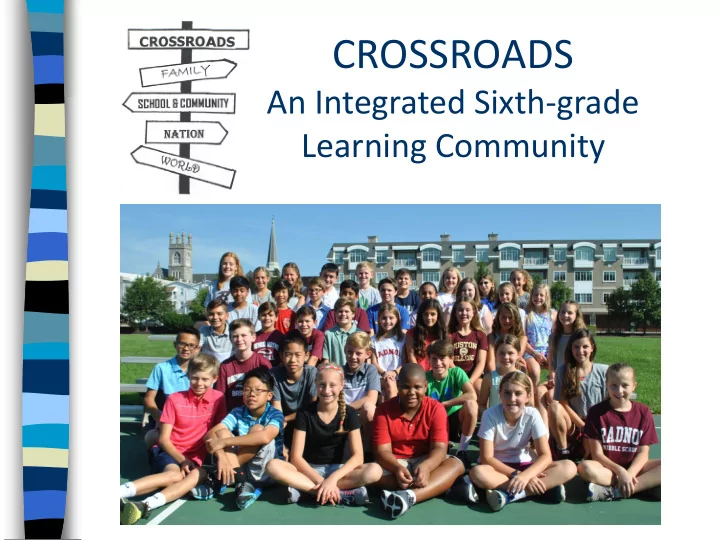

CROSSROADS An Integrated Sixth-grade Learning Community
What is Crossroads? A year-long program, combining the study of: - language arts - social studies - science… around our theme, CULTURE!
How does Crossroads work? 40 incoming sixth graders selected randomly by lottery 4 of 9 class periods spent in the Crossroads room. No separate language arts, science, and social studies classes. Other five periods: math, advisory, encore classes (art, music, phys. ed., tech. ed., FaCS, and world language), lunch.
What do we learn? We learn our language arts, science, and social studies skills through the study of four levels of culture: Family Community Nation World
Family <> Community <> Nation Highlights from September - December Family culture project Full-class Novel: Tuck Everlasting, Community literature circles Writing: A family vignette Powering Up: Natural Resources group project Immigrant Perspectives: interview and essay American Experiences (immigrant group) literature circles and presentation Rock Transformations And much more!
WORLD: January to June Geography and Cultures of each of the following continents: – The Americas – Europe – Africa – Asia Some Associated Activities: Dynamic Earth Project European Cities Project Sonnet Study and Writing Study of Opera Poetry Weather – Group Project Biography Project Two African novellas & Project Asian culture group study and literature circle Persuasive essay Astronomy and Rocketry
Field Trips Field trips – about seven Curriculum Connections Associated writing tasks SAMPLE TRIPS: Philadelphia Mural trip • Lackawanna Coal Mine and Eckley • Miners’ Village Tenement Museum and Ellis Island, • New York City Barnes Museum • Opera Philadelphia • Smithsonian Museums, Wash. D.C. • 174 school days NOT on Crossroads field trips!
More Unique Activities Code for Community Cooperative games and activities Many opportunities to interact with others while you learn
How do students learn in Crossroads? Students work individually and cooperatively to study a variety of science and social studies topics relating to culture Greater emphasis on individual and cooperative projects, presentations, and writing assignments Fewer tests or quizzes
There are NO letter grades? Then how do we know how we’re doing? Self Assessments – Approximately six/year – Student generated – Teachers respond – Parents comment and sign Student-led Parent Conference – November Mid-Year Parent-Teacher Conference – Late January – Early February End-of-year Evaluation – 8-page document written by teachers Evening Expositions – Two per year
The Self Assessment
The Crossroads Room Double-sized room Big class library 40 Chromebooks
MYTHS about Crossroads We won’t have lockers. NOT TRUE! We won’t see non- Crossroads friends. NOT TRUE! We don’t change classes. NOT TRUE! We have less chance of getting into Watershed, Soundings, and Gateways. NOT TRUE!
th Grade Team Schedule Period Proposed Crossroads Schedule Proposed 6 Adv Advisory (orchestra band, Advisory (orchestra band, chorus, etc.) chorus, etc.) 1 Tech Ed/FACS/lang Tech Ed/FACS/lang 2 Crossroads Science 3 Crossroads Social Studies 4 Lunch Lunch 5 Art/Music/Phys. Ed. Art/Music/Phys. Ed 6 Crossroads Language Arts 7 Math Math 8 Crossroads / Math Sci/SS/LA/Math (Extended Learning Time) (Extended Learning Time) SOS Pack up Pack up
Who is Crossroads Compatible? Most of the following should be true Crossroads is right for students who… Work and learn well in groups and/or want to get better at it (not those who allow others to do the work or like to control all the work) Like to explore and “dig deeper” when learning Seek some independence and choice in their learning Prefer to demonstrate learning through projects, presentations, and writing assignments Are interested in how they fit into their community and culture Are not motivated only by A-B-C-D-F grades CROSSROADS IS FOR STUDENTS OF ALL ABILITY LEVELS (with few exceptions)
Crossroads Comparison Some Similarities Some Differences – Same Core Curriculum and skills – L.A., Social Studies, and Science are taught integrated around study of – All levels of math available culture – Encore classes are the same – Emphasis on projects, presentations, and writing (with – Special Ed. And Gifted support fewer tests) – Lockers – Many cooperative and group – Lunch learning projects – Students set yearly and weekly goals for themselves. – Assessed but not graded – Greater need for parent involvement
What Next? • Discuss Crossroads with your parents and decide if you want to enter the lottery. • All students must submit a form stating if you want Crossroads or not. This form is due on May 10 th . • Letters sent out about a week after that. • Crossroads new student/parent meeting on Wednesday May 22 nd at 6:30pm in the Crossroads room at RMS.
CROSSROADS An Integrated Sixth-grade Learning Community
Recommend
More recommend